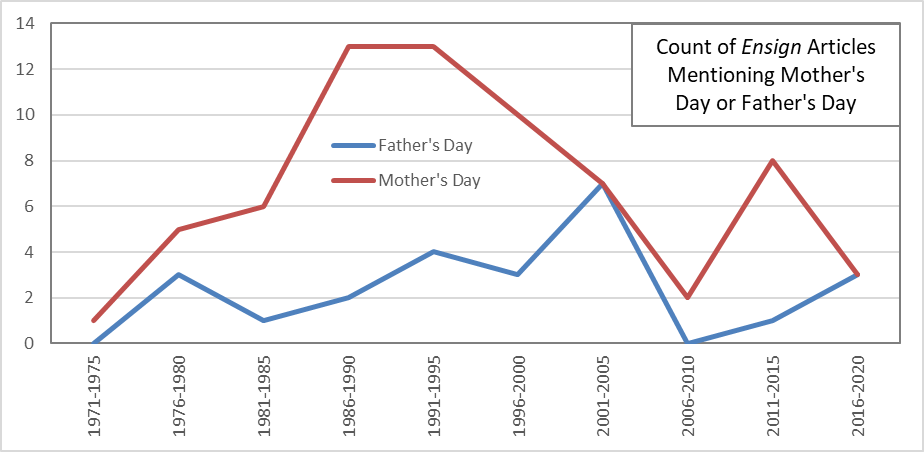For Father’s Day today, my ward gave men a treat, but sacrament meeting talks weren’t focused on the importance of fathers or anything like that. This feels consistent with my experience generally. Father’s Day is mentioned at church, and sometimes talked about, but Mother’s Day by contrast is absolutely essential. It would be unthinkable to have talks about tithing or food storage on Mother’s Day, or even (at least in my experience) to have a stake conference. But Father’s Day is totally fair game to tromp on with other topics. Just to be clear, I’m absolutely not complaining about this. I’m just observing. I can buy my own treats.
The reason this happens is, I think, pretty obvious. Since it has become less acceptable to openly put women down and GAs have largely rhetorically moved from patriarchy to chicken patriarchy, they’ve needed to embrace their opportunities to pedestalize women, and explain at every turn how very very honored and equal they are. Mother’s Day is a great opportunity. Largely male speakers can rhapsodize at the pulpit about how wonderfully self-sacrificing their mothers and wives are, and how inspiring they find it that these women choose to give up their own aspirations in life to serve as supports to the men in their lives. Needless to say, there is no parallel need to reassure men about how important we are. The very structure of the Church communicates it to us constantly. Father’s Day is a nice afterthought, a reminder that oh, sure, fatherhood matters too. But it’s not doing the work that motherhood is, rhetorically, to make it seem more okay that women aren’t ordained or allowed to handle money or run wards or sacrament meetings or the highest Church councils or baptisms or funerals or excommunications. The Church embraces Mother’s Day more than Father’s Day for the same reason that we get conference talks called The Honored Place of Woman, The Moral Force of Women, LDS Women Are Incredible!, and Woman—Of Infinite Worth, but no parallel talks directed at men.
But of course it’s just my experience that a bigger deal is made at church of Mother’s Day than Father’s Day. And I’d understand if you’re a bit suspicious that I’m remembering it that way simply because I expect it to be that way. So I thought I’d do a quick look at Church magazines. I looked for references to both Mother’s Day and Father’s Day in the Ensign (this was the Google search string I used for Mother’s Day: “mother’s day” site:churchofjesuschrist.org/study/ensign). I didn’t read through each article, but I did do some quick checking to make sure the results weren’t spurious (for example, excluding those that matched only because the Table of Contents on the left of the article listed another article that had “Mother’s Day” in the title).
Here are two hypotheses I had before I gathered the data: (1) There would be more references to Mother’s Day than to Father’s Day, and (2) the number of references to Mother’s Day in particular would go up from the 1970s to the 1990s as the Church moved more toward becoming the Church of the Family Proclamation.

As you can see, the total number of mentions is small enough that I put it into five-year bins to make the results easier to look at. The data are surprisingly consistent with both of my hypotheses. Mother’s Day has 68 total mentions, and Father’s Day only has 24. Also, the mentions of Mother’s Day went up markedly in the 1980s and 1990s, although they’ve dropped off again since then.
Again, the number of mentions is really small. For Mother’s Day, 68 in the 50 years of the Ensign is only 1.4 mentions a year. So it’s not like discussion of these holidays is dominating Church discourse. But when one or the other does get brought up, it is, as I expected, far more often Mother’s Day.
I’d love to hear your experiences of whether Mother’s Day or Father’s Day has gotten more emphasis in wards you have lived in.